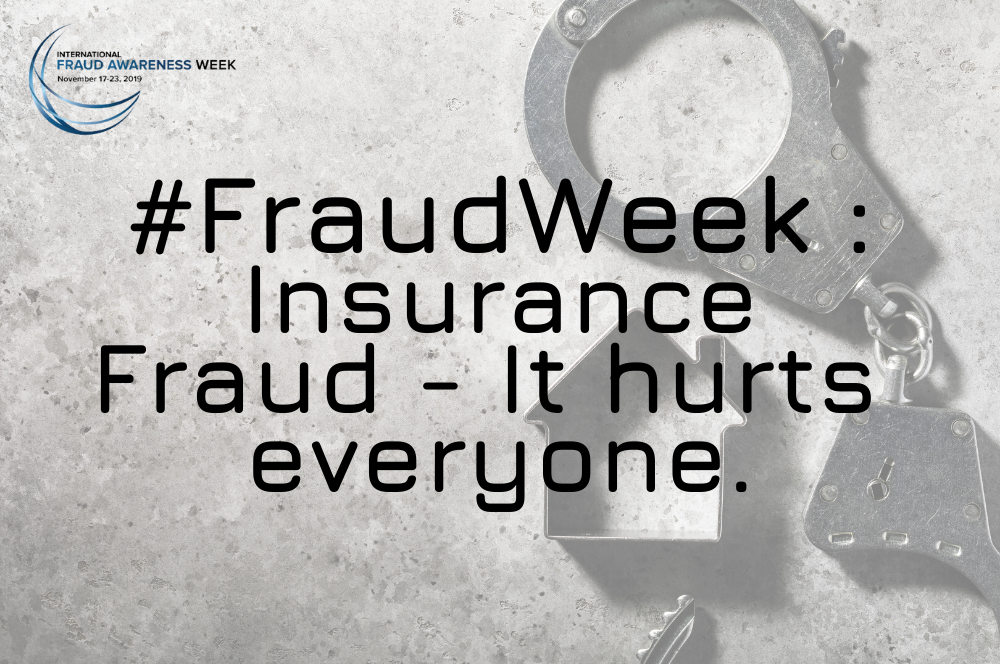
November
19
#FraudWeek: Insurance Fraud - It hurts everyone.
My now husband and I had just purchased our first home. An older home, but a lake front property, with a large yard, 3 car garage, guest house, pool, and enough driveway to park all the cars for family gatherings. Life was great! We were young homeowners after years of horrible rental experiences; we were free! Or so we thought.
Our first spring greeted us with multiple basement floods, so much so that our walls started to “bulge out”. Curious as he is, my husband decided to remove the wet drywall – as he has done in every basement in every previous home we had shared – and words cannot describe the utter dread we felt at the crumbling rock and mortar foundation looking back at us! This house we purchased should not have a basement, but rather a 3-foot tall crawl space. I confided my stress, anxiety and complete devastation to a friend who said,
“You just won the insurance lottery!”
The statement confused me, and I asked for clarification. “Winning the lottery doesn’t happen to everyone,” she said. “But if you win, you can win big. You just won an insurance lottery jackpot: a whole new foundation and damages from your title insurance!”
So I called my insurance company to notify them of the issue. Fast forward 2 years and we have now paid in full, out of pocket, for the foundation repair. I certainly didn’t win the lottery that dreadful day, but it also wasn’t the last time I heard an insurance claim referred to as “hitting the jackpot”.
Jump ahead to 2018 when this now middle-aged Chartered Accountant walks into her new Risk Manager/Internal Auditor role at Peace Hills, a property and casualty insurer. My office door opens to the hallway near our Special Investigation Unit (you know, the “fraud guys”), and every time I hear about another insurance fraud investigation, I can’t help but think… here’s another policyholder who thinks they won the insurance lottery.
False or inflated Claims make up more than three quarters of frauds committed against insurance companies!
Statistics Canada released a study in November 2015 where they determined that, in Canada, over “77% of fraud against individual insurance establishments involved false or inflated claims. Of the remaining incidents, most involved false billing schemes or other types of non-employee fraud against property insurance establishments”. WOW! 77%? I was blown away.
How does this relate to my failed insurance claim and the flooding in my very own basement? It’s the commonly accepted lottery-insurance paradox. When we think of hitting the “Insurance Lottery”, it’s the belief that an insurance claim is an opportunity to be further ahead than before the insurable event occurred. But the truth is: playing the lottery is the exact opposite of insurance; it’s risk-seeking behaviour. While purchasing insurance is to hedge against risks, or rather, a transfer of risk. “Insurance Lottery” is a mental attitude towards insurance and an inherent belief that insurance companies are greedy and love to avoid paying out on claims. Let’s correct this misconception.
No one gets hurt when you make a false claim.
FALSE! Insurance fraud hurts honest policyholders by driving up the cost of insurance for everyone.
In a 2017 consumer survey, 85% of Canadian respondents said they did not trust insurance companies to be “honest” and “fair”. Insurers rank lower than fintech startups with a way shorter existence period and higher failure rate than insurance companies.
Have we as an industry failed to educate people on how insurance works?
An insurance company collects and holds premium payments from many individuals (policyholders) in order to pay the claims of a few; the premiums belong to all policyholders in order to spread the cost of significant losses that many Canadians are unfortunate enough to experience and unable to afford on their own. In other words, if you suffer a loss, a portion of your premium and those several other policyholders finds its way back to you so you can recover from a loss. When a false claim is made, it is a theft from every policyholder on the insurer’s books. When an insurance company is paying out more than the premiums they are collecting, the only outlet they have is to: a) raise premiums, or b) cut costs. Cutting costs directly affects claims service or the insurers desire to provide coverage.
Insurance Fraud comes in all sorts of shapes and sizes.
TRUE! Insurance crimes can be as simple as exaggerating the value of a loss, or as complex as deliberately causing an accident or damage. Some examples are:
⪧ Claiming more damages than what was actually done to the vehicle;
⪧ Deliberately setting fire in order to receive a payment for damages;
⪧ Failing to disclose information to obtain insurance you may not qualify for;
⪧ A service provider billing for services/products that were not provided; or
⪧ Social engineering attacks claiming to be your insurance company and asking you to confirm or give personal information (attempted identify theft)
Strategies for detecting fraud are key to keeping fraud costs down.
Uncovering fraud helps prevent everyone from suffering monetary losses. The more insurers and policyholders know about fraud, the greater our chances are of detecting fraudulent activities and our anti-fraud strategies become increasingly more effective at preventing unnecessary and preventable losses. Here are some tips on how to avoid and identify potential insurance frauds:
⪧ Exercise caution when an unknown person pressures you to replace your current insurance with something else.
⪧ Beware of email messages that claim to be your insurance provider or broker requesting personal or sensitive information.
⪧ Do not pay your premiums through a money transfer, money wiring service, or gift cards.
⪧ If you suspect that a person, service/product provider, or company is engaging in an insurance scam, contact your insurer or your provincial or territorial insurance regulator.
Author: M.N. Roxane Power CPA, CA, Risk Manager / Internal Auditor



